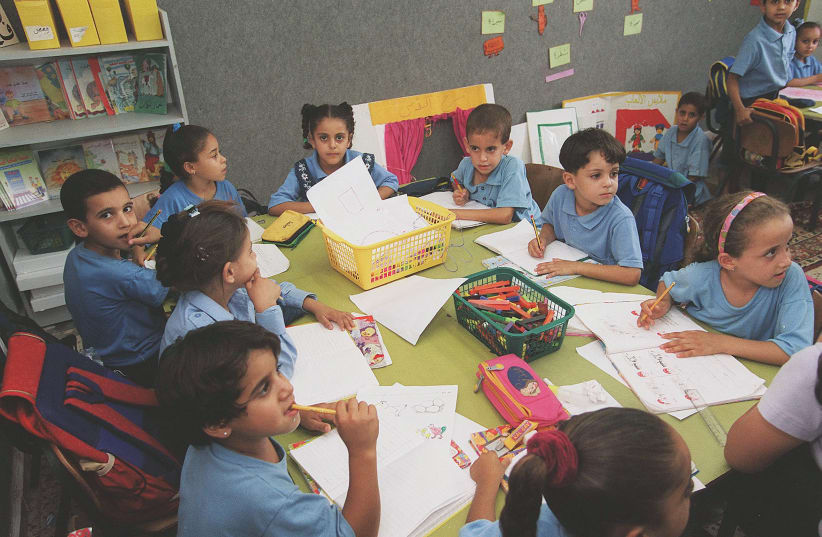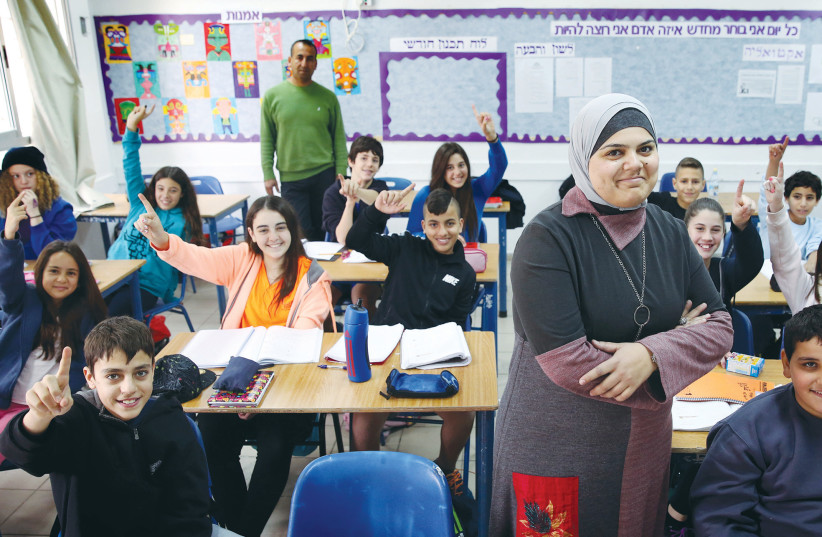Today, when crime in the Arab sector is in the headlines, and not a day (or almost an hour) passes without some bloody incident, we must acknowledge that it all begins with education; and it is in education where most of the solution lies.
From the very beginning, the Arab education system in Israel has suffered from blatant and institutionalized inequality, expressed in a triangle of discrimination; first, in unequal allocation of budgets; second, unequal representation in the higher echelons of the system; and third, inequality in the curriculum.
First, budgetary inequality: The budgets allocated to the Arab school system are far smaller than those for the Jewish system and fall very short of satisfying its most basic needs. According to The Marker, the average investment in an Arab high school student is 40% lower than that in the Jewish state-religious stream, and 20% below the figure for the Jewish state-secular stream. Education Ministry data reveal that the Arab system is allocated lower budgets across the board – fewer days of staff training, a smaller investment in special programs and in informal education, fewer hours of supervision and lower budgets to support weak pupils, alongside a huge shortage of elementary physical infrastructure, computers, science labs and libraries.
Second, the under-representation of Arabs in senior positions in the education system – including supervisors, management and planners. Prof. Daphna Golan-Agnon, who studied the inequality in education, notes that you can count the number of Arab senior officials in the Education Ministry on the fingers of one hand, and that there are no Arabs among the ministry’s decision-makers and planners. This exclusion of Arabs from the senior echelons of the Education Ministry has a severe impact on the system’s performance and on its success in empowering Israel’s Arab citizens.
Arabs ostensibly are present, but in reality are absent from the highest levels of the ministry, where decisions are made. For example, there is not a single Arab heading a district; only recently was an Arab appointed as deputy director-general of the ministry and head of the Technological Education Administration, even though there are many Arabs with the qualifications to fill these positions.
Here it is important to note that since the early 1980s there have been various proposals to establish an autonomous Arab Education Administration, in parallel to the Jewish National-Religious Education Administration, and with an appropriate budget and staff. But these ideas, whether promoted by the Higher Follow-Up Committee for Arab Education, Arab educators, or Arab Knesset members, have always fallen on deaf ears.
The third leg of the triangle is inequality and discrimination in the curriculum. There has never been any deliberate and significant initiative to make it possible for Arab students to study material that reflects their culture, history and literature. Instead, they learn about Herzl and Bialik. This emphasis on Jewish and Zionist values, and the lack of any respect for the Palestinian national identity, is entirely off target. In fact, it reinforces the disconnect and estrangement between the two groups, while exacerbating the Arab minority’s sense of frustration and discrimination. In effect and to a great extent, the Arab school system in Israel institutionalizes the fears: the fear of connecting to the past, the fear of enhancing the sense of cultural and national identity and especially teachers’ fear of discussing current events in the classroom.
It is only natural that the absence of relevant cultural and national material in the Arab schools’ curriculum leads students to try to satisfy their needs elsewhere, mainly on social media. In the words of the Arab intellectual Rashed Hussein: “If we prevent Arab pupils from learning about their people, their nationality and their homeland in school, they will compensate for the deficiency at home and on the street. They will gladly accept everything they hear from people or read in the newspaper, and this is liable to lead to a distorted and inaccurate understanding of their national identity. The school, which has deprived him of something in which everyone takes pride, will be regarded by him as an enemy… [This will produce] a generation filled with inferiority complexes, feelings of abasement, unable to take pride in its youth, in its homeland and its nationality.”
It is essential that the Arab education system enjoy full budgetary equality without further delay. The establishment of an autonomous Arab education administration is crucial. Appropriate representation of Arabs in the senior ranks of the Education Ministry – in order to safeguard the unique features of Arab education – is vital. These are the basic prerequisites for integrating the Arab minority into Israeli society, and with time, will quell the bloody crime wave raging among us all.
The writer is a Senior Fellow at the Israel Democracy Institute.

